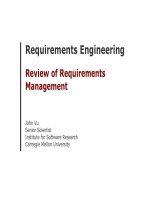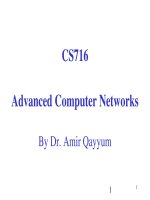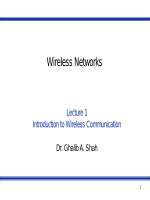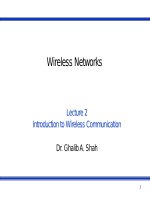Wireless networks - Lecture 45: Review of Lectures 26-44
Bạn đang xem bản rút gọn của tài liệu. Xem và tải ngay bản đầy đủ của tài liệu tại đây (302.51 KB, 25 trang )
Wireless Networks
Lecture 45
Review of Lectures 26-44
Dr. Ghalib A. Shah
1
Last Lecture
4G Overview
► Heterogeneous Wireless networks
► Evolution
► Issues in 4G
Mobility Management
Handoffs
► Types, VHO process, VHO Issues
► Standards
QoS Considerations
2
26 - Outlines
Overview of IEEE 802.11
IEEE 802.11 Protocols
Architecture
Services
MAC Protocols
► DCF
► PCF
3
Overview, IEEE 802.11 Committee
Committee formed in 1990
► Wide attendance
Multiple Physical Layers
► Frequency Hopping Spread Spectrum
► Direct Sequence Spread Spectrum
► Infrared
2.4GHz Industrial, Scientific & Medical shared
unlicensed band
► 2.4 to 2.4835GHz with FCC transmitted power limits
2Mb/s & 1Mb/s data transfer
4
27 - Outlines
Problems with DCF
Virtual Carrier Sensing
RTC/CTS Protocol
Inter-frame Spacing
PCF
Fragmentation / Reassembly
MAC Frame Format
Frame Types
Physical Media in Original IEEE 802.11
5
28 - Outlines
Introduction
►
►
►
►
►
What is Ad hoc networks?
Characteristic
Ad hoc vs. cellular networks
Application
Challenges
Routing Protocol
► Expected Properties of Ad-hoc Routing Protocols
► A taxonomy for routing protocols in Mobile ad
► Some common protocols (DSDV, AODV, DSR, ZRP,
TORA)
6
29 - Outlines
Types of Attack
Goals of 802.11 Security
WEP Protocol
WEP Authentication
Security flaws in original 802.11
7
How 802.1x Address Security Issues of 802.11
EAP Framework
User Identification & Strong authentication
Dynamic key derivation
Mutual authentication
Per-packet authentication
Dictionary attack precautions
8
IEEE 802.1X Terminology
Supplicant
Authentication
Server
Authenticator
Uncontrolled port
Controlled port
9
30 - Outlines
Limitations of QoS in IEEE 802.11
Overview of 802.11e
EDCF
HCF
QoS is realized by introducing traffic categories
(TCs)
Each instance is parameterized with TC
specific parameters
► AIFS, CWmin, CWmax, Persistence factor (PF)
10
Example
Network B
Foreign Agent
Home
network A
Internet
Home Agent
Network C
Mobile Node
Corresp.
Node C
slide by Konidala M. Divyan [3]
31 - Outlines
Introduction to WMN
Characteristics
WMN vs MANET
► Backbone, dedicated routing, mobility, multiple radios
Architecture
Applications
Critical factors influencing performance
►
►
►
►
►
►
Radio techniques
Scalability
QoS
Security
Ease of Use
Mesh connectivity
12
32 - Outlines
MAC Layer
►
►
►
►
Scalability
Multi-Channel
Some Ideas
Research Issues
Network Layer
►
►
►
►
►
Routing
Wish List
Route Optimization Criteria
Routing fairness
Routing – Cross-layer design
QoS Support at each layer
WMN Standards
13
33 - Outlines
TCP Variants
► Slow start
► Fast Retransmit/Recovery (TCP Reno)
Issues in Heterogeneous Wireless Networks
TCP Schemes for Wireless
►
►
►
►
Pure Link-level Approaches
Soft-state Transport Layer Caching Approaches
Soft-state Cross Layer Signalling Approaches
Hard-state Transport Layer Approaches
14
34 - Outline
Introduction to WSN
Applications of WSN
Factors Influencing Performance of WSN
►
►
►
►
Power consumption
Fault tolerance
Scalability
Topology
Architecture and Communication Protocols
Challenges in WSNs.
15
35 - Outlines
Attributes of MAC Protocol
Energy Efficiency in MAC
Proposed Routing Protocol
►
►
►
►
►
►
S-MAC
T-MAC
DS-MAC
Traffic Adaptive MAC
DMAC
Contention-Free MAC
16
36 - Outlines
Routing Challenges and Design Issues
►
►
►
►
►
►
Deployment
Routing method
Heterogeneity
Fault tolerance
Power
Mobility etc
Routing Protocols
►
►
►
►
►
►
►
►
SPIN
Directed Diffusion
ACQUIRE
LEACH
TEEN/APTEEN
GAF
GEAR
SPEED
17
37 - Outlines
Transport Protocols for WSN
TCP/UDP for WSN
Protocols
► PSFQ
► ESRT
► CODA
Security Threats in WSN
TinySec
Motivations of Link Layer security
TinySec Design goals
18
38 - Outlines
Security primitives in TinySec
Encryption Schemes
Keying mechanism
WMSN
►
►
►
►
►
Architecture
Applications
Advantages
Design Considerations
Protocols
WSAN
► Motivation
► WSN vs WSAN
► Architecture
19
39 - Outlines
Bluetooth introduction
Technical features
Access technique
Bluetooth topology/scenario
Specifications
Core Protocols
Link connections
20
40 - Outlines
IP Over Bluetooth
Bluetooth Security
WPAN Standards
IEEE 802.15.3 Overview
802.15.3
► Topology
► Coordination
•
•
•
►
►
►
►
Starting a Piconet
Handing over control of piconet
Creating child piconet
Medium Access (Super-frame)
Channel Time Management
Power management
MAC Frame format
21
41 - Outlines
IEEE 802.15.4
► Basics, Type of Devices
► Phy Layer
► Channel Access Mechanisms
• Slotted/Unslotted CSMA/CA
► Super-frame Structure
22
42 - Outlines
WiMAX Basics
802.16 Evolution
23
43 - Outlines
Reference Model
Burst profiles
Classes of Uplink service
24
44 - Outline
4G Overview
Mobility Management
Handoffs
25









